How to choose your first triathlon?

- 1. Understanding the Basics of a Triathlon
- - Defining a triathlon: Essentials and Distinctive Elements
- - The Importance of Setting Realistic Goals
- 2. Know Your Strengths and Weaknesses
- 3. Choosing the Right Triathlon for You
- - Sprint Triathlon: A Good Starting Point
- - Olympic Triathlon: An Intermediate Challenge
- - Ironman Triathlon: The Ultimate Test
- 4. Preparing For Your First Triathlon
- 5. Equipments to Consider for Your First Triathlon
- - Importance of Quality Gear
- - Investing in a Proper Triathlon Suit and Shoes
- - Choosing the Right Bicycle: Road Bike vs Triathlon Bike
- 6. Post-Triathlon Evaluation and Future Plan
1. Understanding the Basics of a Triathlon
Embarking on your first triathlon? Let's break down the bare basics. A triathlon, in essence, intertwines swimming, cycling, and running - a fierce blend of endurance activities. It demands commitment, discipline and a gutsy attitude. But why participate in a triathlon? Certainly, it's not just for the shiny medals. Channeling your energies into challenging yourself, enhancing your fitness, and ramping up your competitive spirit - that's what keeps the wheels of the triathlon turning. Every participant has their unique reasons, but what remains common is the goal - a powerful drive to surpass self-imposed limitations. It’s not just a race; it’s a personal journey for triumph. So, are you ready to immerse yourself in this gritty endeavor?
- Defining a triathlon: Essentials and Distinctive Elements
A triathlon is a race that challenges your courage, determination, and perseverance, promising a unique sense of satisfaction in return. At its core, a triathlon sends athletes on an exhilarating journey through the trifecta of swimming, cycling, and running. This composite event harmoniously binds these three disciplines together, pushing the boundaries of physical endurance and mental tenacity. The lengths of each leg can vary, but the standard format includes a 1.5-km swim, 40-km bike ride, and a 10-km run. Every triathlon event begins with swimming, followed by cycling, and finally, running. One of the most distinctive elements of a triathlon is the transition stages, often referred to as T1 and T2. T1 signifies the switch from swimming to cycling, and T2 from cycling to running. Preparing for a triathlon demands disciplined training, covering all three sports, alongside focusing on improving transition times. Indeed, it's a test of the athletes' versatility and adaptability, as the challenge lies not just in excelling in one discipline but conquering all three. In essence, competing in a triathlon is a celebration of human spirit and resilience. Regardless of whether you finish first or last, simply participating in a triathlon is a triumph in itself.
- The Importance of Setting Realistic Goals
The journey to competing in a triathlon involves spine-tingling excitement, hellish training periods, and periods of self-doubt. However, a significant pivotal point in your triathlon journey rests on setting realistic goals. Being realistic with your goals doesn't mean setting the bar low or dampening your ambition. It involves understanding your current fitness level and molding your goals around it. This step is crucial in preventing burnout while maximizing your training results. Many triathlon beginners have the common misconception that their initial aim should be to win. From an objective viewpoint, the initial goal shouldn't be to become a champion overnight, but rather to become the best version of yourself each day. A goal can be as simple as being able to complete your first swim without stopping. Remember that each triathlon has different challenges, and the journey to mastering all three disciplines is filled with ups and downs. Finding a balance between pushing your limits and acknowledging your capabilities is the foundation of setting realistic goals for your first triathlon. In the end, it's not just about crossing the finish line, but also about the journey and what you learn about yourself along the way.
2. Know Your Strengths and Weaknesses
In your pursuit to compete in a triathlon, understanding your strengths and weaknesses is a crucial stepping stone. It's your inner compass, guiding you on how to structure your training. First off, appraise your physical fitness through professional screenings; Do you thrive in endurance runs or are your lungs more attuned to quick swims? Secondly, where does your passion lie; swimming, cycling, or running? Identifying your preference doesn't just amplify the joy in your journey but also magnetizes you towards your benchmarks. Remember, this journey is as much about personal growth as it is about crossing the finish line. The self-awareness you gain will serve as the backbone of your whole triathlon journey.
- Assessing your Physical Fitness
Successfully participating in a triathlon requires a strong understanding of your current physical fitness level. Before you lace up those running shoes or hop on that bike, it's crucial to thoroughly assess your endurance, strength, and overall health. Exploring your heart rate, muscle resistance, and capability to endure efforts over a steadily increasing period without fatigue are key markers you want to pinpoint. Remember, a triathlon is not merely a test of speed, but a challenge of lasting stamina, and perhaps more importantly, mental resilience. If you're a newbie, forget measuring yourself against the clock, focus instead on completing the course. Testing your limits in the three disciplines, swimming, cycling, and running, is about building familiarity with your body’s unique reaction to different stressors and environments. When you know your strengths and weaknesses, you can craft an effective and realistic training plan. However, neglecting this essential assessment can lead to overstraining, injuries, or simply a disappointing performance on race day. Listen to your body; it's your most trusted guide on this journey. In the triathlon space, you'll soon realize that true victory lies not in besting others, but constantly improving upon your previous benchmark and tapping into a higher level of physical fitness. Through consistent assessment of your abilities, what felt impossible yesterday can become attainable tomorrow.
- Deciding your Primary Focus: Swimming, Cycling, or Running
In the journey of preparing for a triathlon, deciding your primary focus between swimming, cycling, and running is a pivotal step. This decision relies heavily on your current fitness level, interest, and actual proficiency in each of these disciplines. Some athletes may excel in running, others may have a knack for cycling, while some may find their strength lies in swimming. It's important to understand that there's no one-size-fits-all approach here. Determine where your strengths lie — are you the type that takes to water like a fish, or perhaps the open road calls to you for an exhilarating cycle ride, or maybe you feel the most alive when you're running, with the wind in your hair and the ground beneath your feet? Bear in mind, this choice will heavily impact your training program, so it's essential to be honest about your skills and inclination. Experimenting with all three sports before settling on your area of focus is a wonderful way to understand what motivates you, as each sport offers a unique challenge. Remember to listen to your body, it's your greatest guide. After all, a triathlon is not just about the destination, it's about enjoying the journey too.
3. Choosing the Right Triathlon for You
Choosing the right triathlon can make a significant difference in your triathlon journey. Whether you're a beginner or a seasoned athlete, it's crucial to choose a triathlon that aligns with your abilities and goals. For those just starting out, a Sprint Triathlon, with its shorter distances, is often a prudent choice. Not quite a newbie but not quite a pro either? The Olympic Triathlon strikes a perfect balance. But if you're looking to test your limits, consider the gruelling Ironman Triathlon, a test of grit, strength, and endurance. Remember, choosing the right race isn't about proving anything, it's about finding the path that best suits your athletic journey. Don't rush the process, and make sure to enjoy every step of the journey!
- Sprint Triathlon: A Good Starting Point
The Sprint Triathlon may be your perfect starting point if you are ready to prove your mettle in the challenging but rewarding triathlon world. For beginners aiming to start their triathlon journey, the Sprint Triathlon, with its comparatively shorter distances, stands as a compelling gateway into the sport. It incorporates a 750m swim, a 20km bike ride, and a 5km run, offering a balanced blend of the three disciplines, far less daunting than the longer triathlon versions. It challenges your abilities, yet does not overwhelm nor bring to the verge of physical exhaustion. It is not just about the race but about enjoying the journey - the training, preparation, discipline and most importantly, the sense of accomplishment. By participating in a Sprint Triathlon, you get to understand your strengths and weaknesses and develop strategies that may be beneficial for longer races. So, are you ready to dive into the pool, mount that bike, and hit the running shoes? Remember, in the world of triathlon, it's never about how fast you can go, but rather about challenging yourself and pushing your limits. A Sprint Triathlon is thus a good starting point to fuel your journey ahead in the realm of triathlon racing.
- Olympic Triathlon: An Intermediate Challenge
Dipping your toes into the grandiose world of triathlons? Then, the Olympic Triathlon is the course you might want to conquer. Known as the "Intermediate Challenge", the Olympic Triathlon unequivocally testifies your capability and endurance, transitioning you from a beginner to an intermediate triathlete. Sounds intimidating, right? But hey, don't you worry! It's indeed a challenge, but a feasible one. A typical Olympic Triathlon consists of a 1.5km swim, a 40km bike ride, and a 10km run. The sheer accomplishment of completing such a well-rounded endurance event is undeniably electrifying and rewarding. Your strengths are pushed, weaknesses unveiled, and spirit invigorated. Remember, it's not a race against others but a race against your own limits. Training for an Olympic Triathlon; however, requires a fundamental shift—an uptick in your training volume, structured routines, and more nuanced attention to diet and recuperation. It's no longer about just finishing, it's about becoming faster, stronger, and more efficient. As an intermediate challenge, it's a stepping stone towards the more demanding formats of triathlons, like the Ironman. So, are you prepared to scale the heights of this spectacular endurance event, and etch an indelible mark of accomplishment? Then tie up your laces, plunge into the water, and pedal beyond the horizon—because the Olympic Triathlon awaits your arrival!
- Ironman Triathlon: The Ultimate Test
Reaching the pinnacle of endurance sports, the Ironman Triathlon stands as the ultimate test of physical prowess and mental toughness. A daunting challenge, you ask? Indeed, but the triumph that lies beyond the finish line is worth every grueling stride, pedal, and paddle. The triathlon's fearsome combination of a 2.4-mile swim, 112-mile bike ride, and a full 26.2-mile marathon run is not for the faint-hearted. It's a test reserved for those who aren't afraid to push their body to its very limits and reach deep within their soul, seeking a resolve and inner-strength that surpasses ordinary understanding. You might ask, "Why does one choose to compete in such a rigorous event?" The answer lies within each triathlete, bound by a shared love for endurance, the pursuit of physical excellence, and self-improvement. To tackle the Ironman Triathlon, you'll need more than just physical stamina; it demands mental fortitude, resilience, and an unwavering dedication forged through months, if not years of disciplined training. Ultimately, completing the Ironman is an affirmation of your character and spirit – a testament to your ability to conquer every imaginable obstacle life throws your way. Is there a more exhilarating test that you could put yourself through?
4. Preparing For Your First Triathlon
Getting ready for your inaugural triathlon can be an exhilarating journey but like any other challenge, it requires smart preparation. The essence of success lies in structured, consistent training. Design a training schedule that progressively increases in intensity and duration, allowing your body to adapt to the escalating demands without injury. Remember, the mantra is to listen to your body and not exhaust it. Safety should never be compromised. Whether you're running, cycling, or swimming- wear suitable gear, abide by traffic rules, and never push your body beyond its physical limits with proper rest and nutrition. After all, it's not just about crossing the finish line but how you get there!
- Importance of Structured and Consistent Training
Structured and consistent training forms the very foundation of a successful triathlon journey. You can't simply jump into the race expecting great results without a well-balanced, consistent training regimen. This is more than just practicing the three disciplines; it involves mastering the transitions, optimizing stamina, and building resilience. It's about setting up a rhythm, unveiling your hidden endurance. After all, a triathlon is not a sprint but a test of endurance. Consistency, in this context, doesn't imply an unchanging routine. On the contrary, your training should be dynamic, constantly adjusting to your growing strengths and improving the weaknesses. Switch between high-intensity workouts and active recovery days; this not only prevents injuries but also aids in muscular development. The goal here is not rapid improvement but rather steady progression. Remember that Rome wasn't built in a day, and similarly, you cannot become a proficient triathlete overnight. A structured training plan, customized to your unique needs, can work wonders. This plan should ideally incorporate flexibility exercises, strength training, aerobic conditioning, along with your swimming, cycling, and running drills. This varied approach to training would keep monotony at bay, preventing any burnouts, and ensuring that your mind and body are always ready for the challenge. So remember, a solid, consistent training program is your first step towards triathlon success, don't underestimate it!
- Essential Safety Tips
In training for your first triathlon, understanding essential safety tips should be one of your top priorities. Keep in mind the saying, "Safety First". During your swimming, cycling, and running regimens, you need to prioritize looking after your physical well-being – you're not a machine, remember? Concentrate on the correct techniques in each discipline and don't push yourself too hard too soon. Preventive measures can save you from critical injuries. When cycling, for instance, always wear a helmet, and if on open roads, keep in mind the traffic rules. Also, remember to stay hydrated. Did you know dehydration can result in extreme fatigue and poor physical response? And let's not forget the importance of a proper warm-up before you dive into your rigorous training, ever considered the benefits? A good stretch can actually help avoid unnecessary strains. Trust me, I've learned this the hard way! In the grand scheme, paying attention to these safety fundamentals can actually boost your performance in the long run. So, lace up your shoes, zip up your triathlon suit, and slap on your swimming goggles, but not without keeping safety tips at the forefront of your regimen. Remember, a safe triathlon is a successful triathlon. Who wants to succeed while compromising their health, right?
5. Equipments to Consider for Your First Triathlon
When it comes to gearing up for your first triathlon, selecting the appropriate equipment is crucial. The importance of quality gear can't be overstated, as it directly contributes to your performance and comfort. A worthwhile investment awaits you in a professional triathlon suit and shoes that offer a streamlined fit and optimal support. The integration of these items can considerably ease your transitions, enhancing your overall race time. Next, choosing the right bicycle becomes a critical decision. While a road bike might seem like the obvious choice, a triathlon-specific bike could provide an edge with its design features catering precisely to the triathlon’s demands. Remember, the right equipment tailored to your needs can be a game-changer in your triathlon journey.
- Importance of Quality Gear
Whether you're a novice or a seasoned triathlete, the importance of quality gear cannot be overstated. High-grade equipment is not simply about brand names or high costs, but about efficiency, comfort, and safety. Thrust into an intense amalgamation of swimming, cycling, and running, your body will be pushed to its limits. Investing in top-tier gear, specifically designed for these physical athletes, plays an essential role in enhancing performance and preventing injuries. For instance, speed and smooth transitions between different disciplines can be drastically improved with a high-quality triathlon suit, just as the right bike, tailored to your particular needs, can help slice off valuable minutes from your cycling time. Additionally, don't forget the significance of a pair of well-fitted shoes, which can make a world of difference in the running stage, keeping your feet happy and minimizing injury risks. In essence, skimping on gear might seem tempting for those on a tight budget, but if you're serious about triathlons, remember: quality gear is a worthwhile investment. It's about choosing wisely, not expensively – ensuring you are equipped with the best gear for your specific needs. You wouldn't enter the battlefield without armour, would you? Remember, your equipment is your partner in this extraordinary endeavor, so choose wisely!
- Investing in a Proper Triathlon Suit and Shoes
Investing in the right gear for a triathlon is as vital as your training routine. When it comes to picking your first triathlon suit and shoes, certain attributes need to be prioritized. An ideal triathlon suit should be not only lightweight but comfortable, built with moisture-wicking fabric to keep you dry during the rigors of the race. Moreover, it should offer UV protection since triathlons are typically outdoor events, and above all, it must permit unrestricted movement during all three triathlon segments. Similarly, the right shoes play a crucial role in your performance. They should be lightweight, designed to optimize your speed and energy efficiency. Look for features like breathability and quick-drying capabilities, as these enhance overall comfort and help minimize blisters. Further, triathlon-specific shoes come equipped with seamless interiors to enable barefoot usage, a vital provision for speedy transitions between race segments. However, it's essential not to rush your purchase. Take your time to try different options and select a suit and a pair that suits your needs best. Remember, the right equipment may significantly enhance your performance and make your first triathlon experience one to remember!
- Choosing the Right Bicycle: Road Bike vs Triathlon Bike
Choosing the right bike for a triathlon event can be a decisive factor in your performance. There's always a debate between a Road Bike vs Triathlon Bike. So how do you decide? Let's break it down. A Road Bike is almost universally versatile and can be used across multiple cycling events, not just triathlons. They are designed for comfort and are usually lighter, thus perfectly suited for those hilly courses. However, a critical consideration is - can it be efficient enough on a flat course where speed is the main factor? This is where a Triathlon Bike comes into the equation. These are expressly designed for triathlons, featuring an aggressive, forward-leaning position that improves aerodynamics, minimizes wind resistance, and conserves your leg muscles for the later running section. The downside? They might not be as comfortable or versatile as road bikes. To sum it up, your choice must revolve around the race course, your comfort level, and where you see yourself in the future of this sport. Will it be more multi-terrain road races or flat, speedy triathlons? Understanding the trade-offs can help you make an informed decision. So, Road Bike or Triathlon Bike – what's it going to be?
6. Post-Triathlon Evaluation and Future Plan
After crossing the finish line in your first triathlon, it's crucial not to stop there. It's time to dive into your post-triathlon evaluation and future plan. Assess your performance thoroughly; where did you excel, and where could you use some improvement? What were your most significant challenges, and how did they shape your experience? Use these insights to fuel your training for the next triathlon, to push your boundaries further. Remember that growth comes from intense challenges, so don't shy away from ambitious goals. After all, isn't pushing past our limits what participating in a triathlon is all about?
- Reviewing your Performance: What did you Learn?
Upon completing your first triathlon, it is vital to take time to review your performance. The finish line signifies a fresh start - an opportunity to learn, evolve, and propel towards greater challenges. So, what did you learn from this experience? You might have discovered that the actual triathlon is more intense than the training, despite precise preparation. The adrenaline rush, the crowd's cheers, and the competitive spirit adds a whole new layer to the event compared to the more solitary training sessions. Furthermore, you might have pinpointed some strengths and weaknesses you weren't previously aware of. Perhaps you excelled at the cycling portion, but struggled to keep pace with the swimming. These insights are invaluable, helping you identify the areas that require extra focus in your future training. The importance of nutrition and hydration would have become crystal clear during the race. The significance of properly fueling your body before and during the race is something that is often learned through experience. Last but not least, in a demanding and exhausting event like a triathlon, you would have learned a lot about your mental fortitude. Triathlons are not just about physical fitness, but they also test your mental grit and determination.
- The success lies in not just crossing the finish line, but also exploring your strengths, confronting your weaknesses, and most importantly, learning lessons to make your next triathlon better.
- Planning your Next Triathlon: Pushing Further Boundaries
Upon conquering your initial triathlon, a world of limitless opportunity and endless challenge awaits you. The beauty of triathlon lies in its infinite possibilities. It's time to stride forward. Planning your next triathlon becomes an essential and integral part of your journey to push further boundaries. To amplify your performance, you will need to incorporate all you have learned into a stronger, more effective future program. Looking back at what worked and what didn’t, will help you galvanize your triathlon journey. Training plans need to be spruced up, strategies need to be reviewed, and goals need to be more ambitious. Perhaps, you might consider joining a triathlon club or finding a seasoned mentor this time around. Cross-training exercises can foster flexibility and strength thus making a tremendous difference in your progression. Your nutrition also plays a pivotal role in shaping your performance. Research, consult and plan your diet accordingly. Aim to make small but consistent improvements. Remember, consistency is the key in triathlon. Ultimately, embrace the process, for it’s the journey rather than the destination that truly shapes a triathlete. So, are you ready to push your boundaries in your upcoming triathlon?
Embarking on your first triathlon adventure can be thrilling yet overwhelming. Remember to understand the basics, gauge your strengths, pick the right triathlon type and commit to consistent training. Choosing quality equipment will also serve as an added advantage. Use your first triathlon experience as a stepping stone, analyze your performance and draft future plans. Progress may be gradual, but perseverance can turn novice triathletes into seasoned competitors. Foster your passion and let the triathlon journey lead you to newer heights.










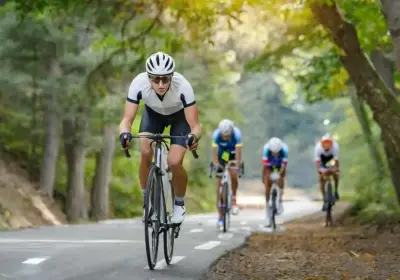


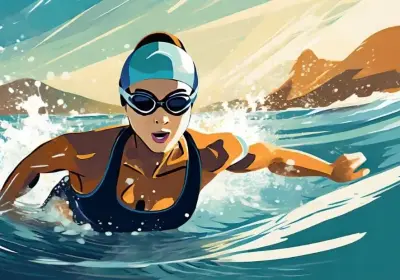
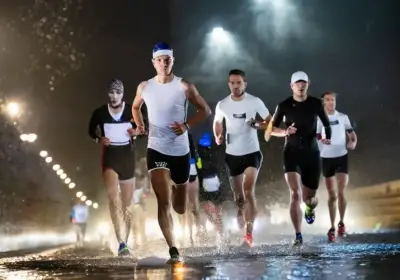


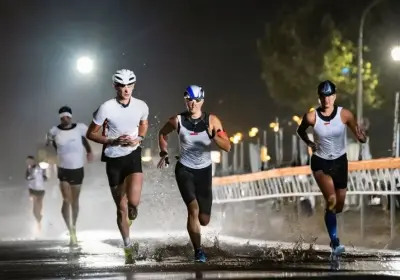






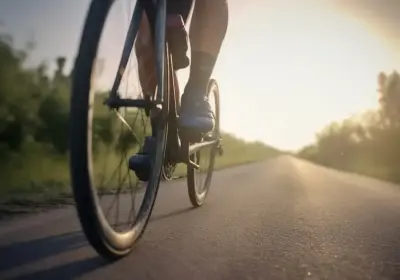
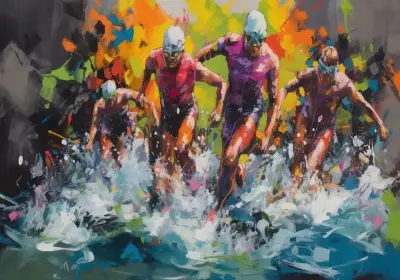

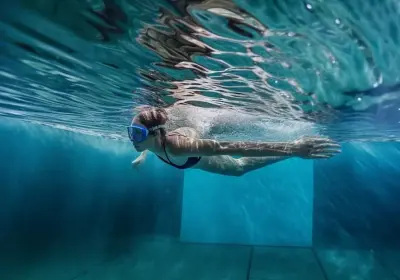
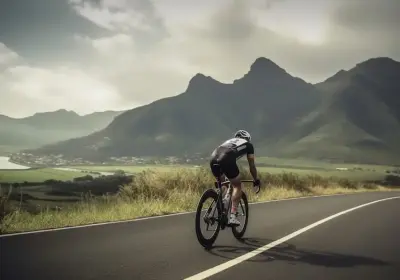
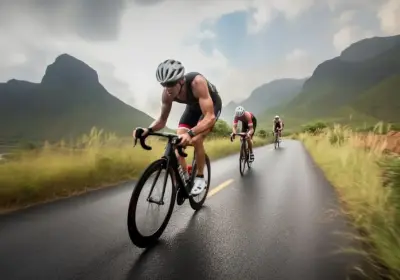








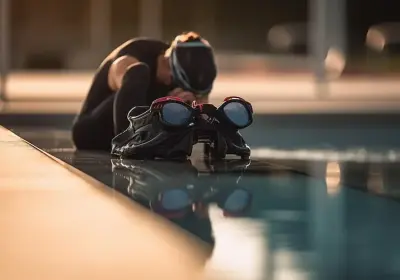
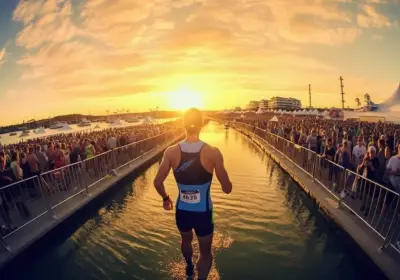






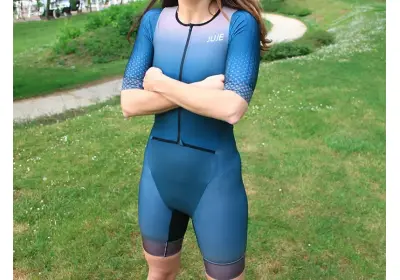


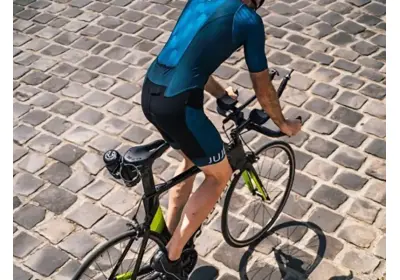
Leave a comment